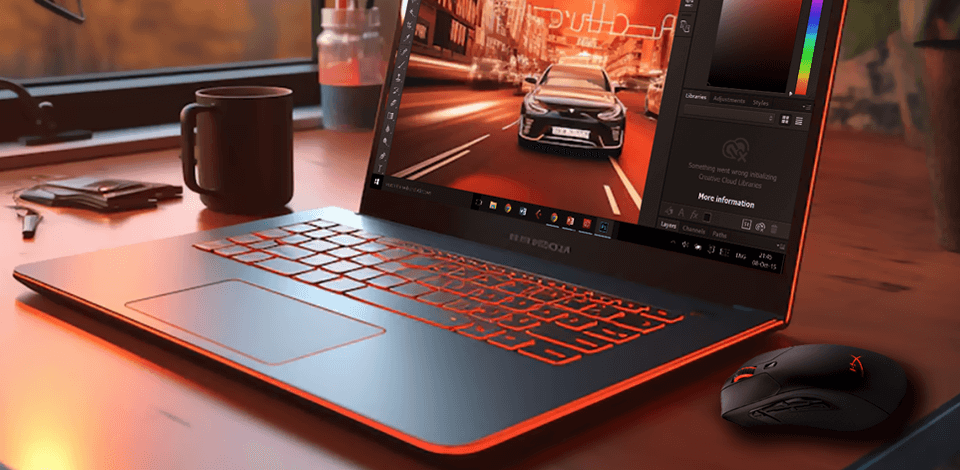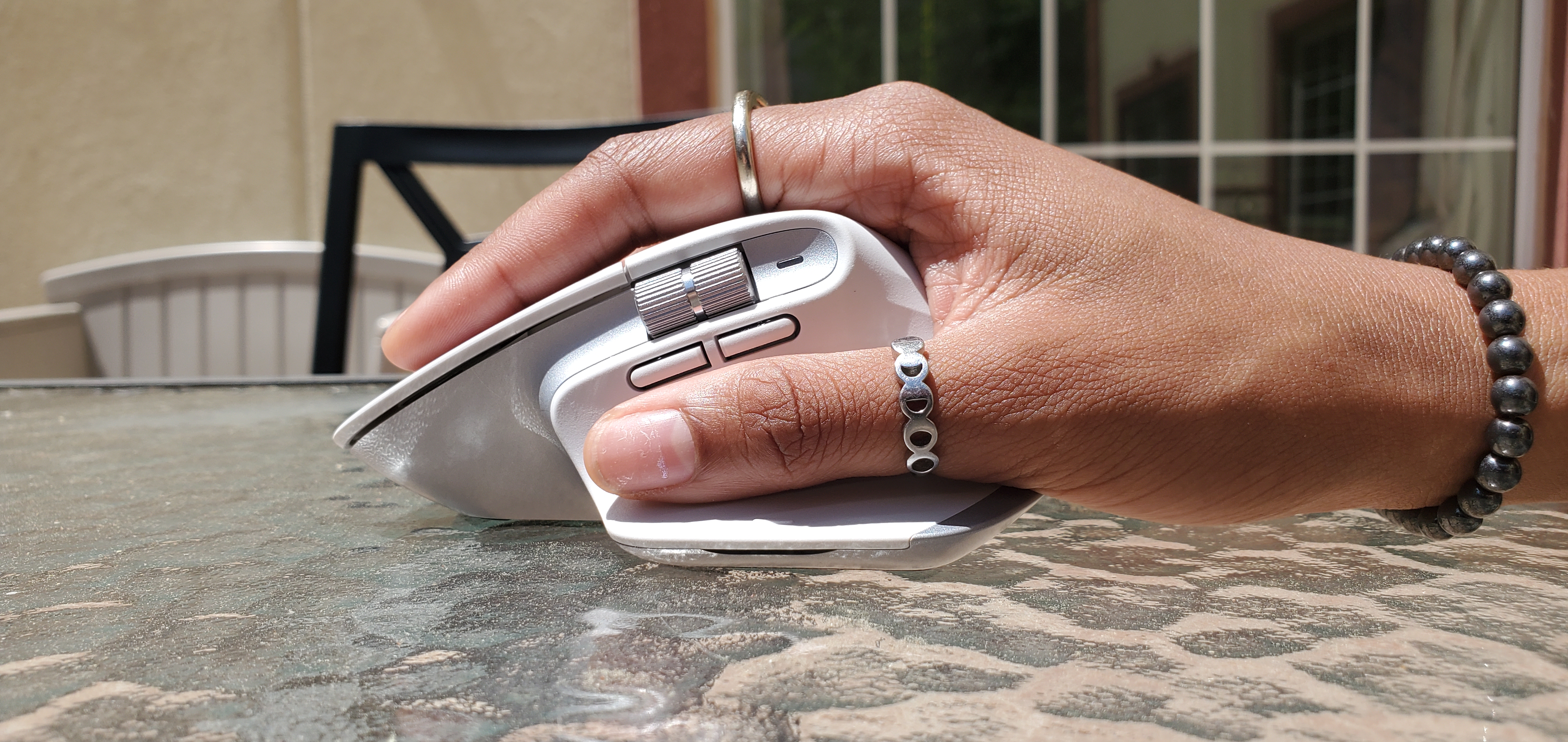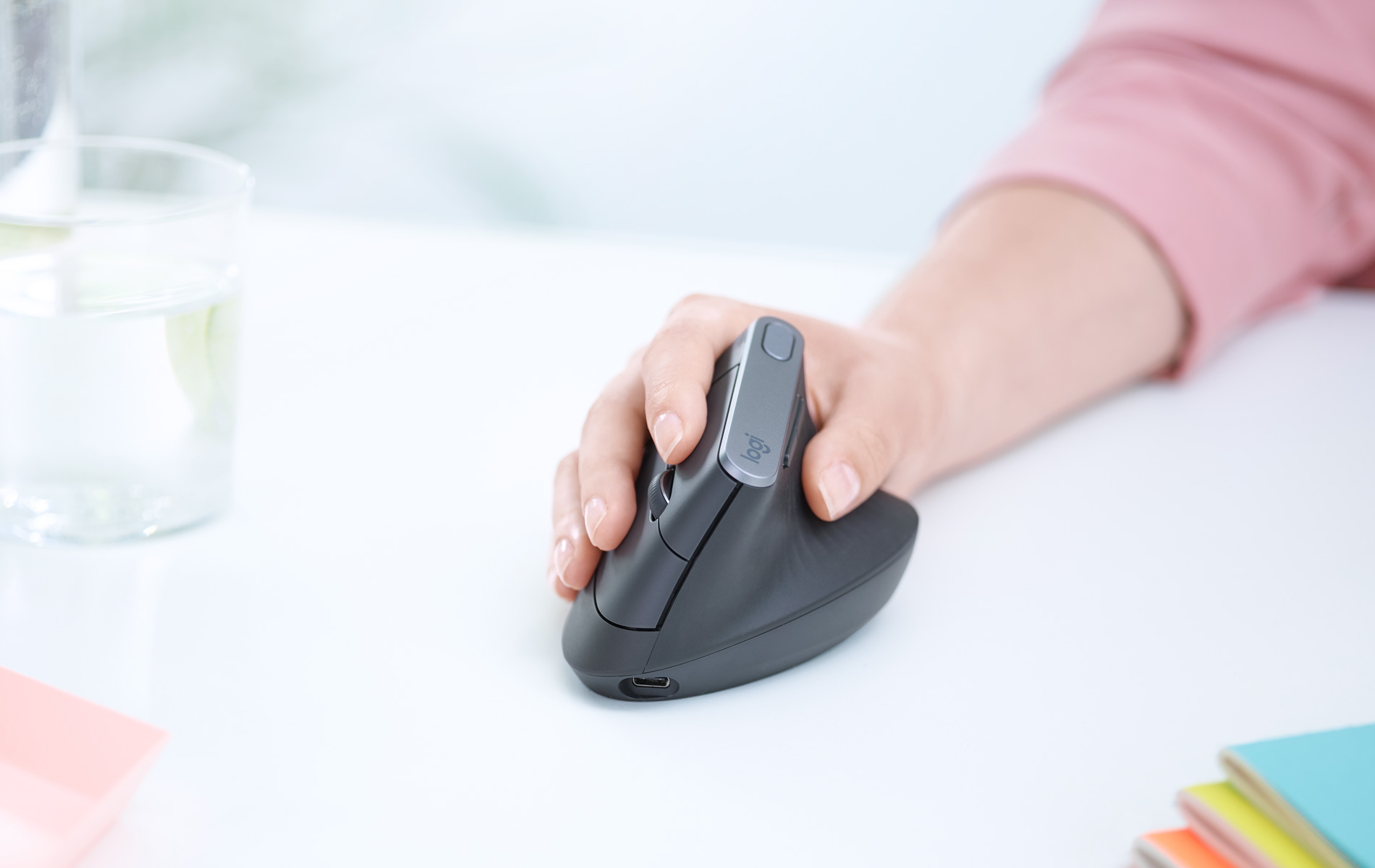
Logitech MX Ergo Wireless Trackball
As a digital artist and designer, I've opted for the Logitech MX Ergo Wireless Trackball. Its trackball is super speedy and precise, and the adjustable tilt lets me work on designs for hours without my wrist feeling like it's about to fall off.
However, I’ve recently bought a laptop for graphic design to work on the go and decided to try something new in terms of mice for it. I consulted with colleagues, read Reddit and comments on YouTube, and selected a few mice for testing.
I considered features, design, value, and performance based on my own experiences and dozens of customer reviews. I meticulously tested each mouse and now want to share my ideas on who can benefit from such accessories.
Best trackball mouse for creatives

DPI: 512 – 2,048 | Interface: Bluetooth and 2.4GHz wireless | Buttons: 8, 6 programable | Scroll wheel: Scroll wheel, thumbwheel
The ergonomic body of this graphic design mouse is a serious advantage for me. The sculpted shape cradles your whole hand and fingers, which is paramount for reducing muscle strain. The soft rubber top is another benefit. Now even during long design marathons in free graphic design software, I don’t experience tension or pain.
For graphic designers, precision is paramount. The MX Ergo totally satisfies this requirement. The trackball is very accurate, letting me click on tiny text details with ease. There's even a button next to the trackball that activates a super-precision mode, reducing the ball-to-cursor movement. This means I get ultimate control over super-detailed design projects.
There is the Logitech Options software, using which I can customize the eight buttons on the mouse. Thus, I can program them with all my go-to shortcuts. This is very helpful for my design workflow, especially when I'm manipulating sprites in Affinity Designer or diving into photo edits. This trackball mouse for photo editing will handle any design task I throw at it.
Best for Mac users

DPI: 8,000 | Interface: Bluetooth and 2.4GHz wireless | Buttons: 7 programmable | Scroll wheel: Dual (vertical and horizontal) with adjustable speed
Right off, I noticed how solid the MX Master 3S feels. It's very ergonomic, supporting your hand at a better angle than most other mice. Plus, the thumb rest is very comfortable too.
The middle scroll button is worth special mention. Frankly speaking, it is one of the best options I’ve ever tried. The MX Master 3S has a whopping 8 buttons, which is more than any other graphics mouse in this review. You can customize them all using the Logitech Options software. The coolest part for me is the possibility to set it up to work with three different devices at once without messing with tiny dongles.
For graphic design tasks in Krita or Photoshop, or even video editing workflows, the MX Master 3S is an exceptional choice. However, for users working in CAD or 3D modeling apps, a dedicated CAD mouse remains the preferred option.
Best for Apple aesthetics fans

DPI: up to 1800 | Interface: Wireless | Buttons: na | Scroll wheel: na
If you want a visually appealing complement to your Mac computer, this model will interest you. I particularly like the multi-touch surface. With it, I can navigate through web pages and documents using swipe gestures. It imitates the experience of a touchpad but in the form of a mouse. Besides, thanks to Bluetooth connectivity, I can forget about entangled wires.
However, such a design isn’t universally appealing, particularly for users favoring ergonomic mice. In my personal experience, the low profile and the absence of a dedicated middle button causes problems during intensive work in UI design software. Moreover, the mouse lacks a traditional right-click button, so a user has to lift their left finger to register a right-click action.
The Magic Mouse seemed awesome at first, but for graphic design work in Adobe Illustrator and free Photoshop, it wasn't very helpful. The swiping tricks are great for moving around 2D graphics, but when I need pinpoint accuracy and have to click a lot, it gets frustrating.
Best for creatives on the move

DPI: 4000 | Interface: Bluetooth, 2.4GHz wireless | Buttons: 8 programmable | Scroll wheel: Dual MagSpeed adaptive
After playing around with it for a while, I can say the small size makes it awesome for working on the go. Even though it's tiny, it is still one of the best mice for graphic design due to its versatility. I can use it with up to 3 different computers at once. This is super helpful for me because I can switch between my MacBook and my Windows computer for graphic design promptly.
The mouse impresses with its rapid charging capability. A single minute of charging provides up to three hours of uninterrupted use. I am very grateful for this feature as I forget to charge it in advance sometimes. On top of that, the tracking works perfectly even on glass. I can use it anywhere, from my favorite coffee shop to a cramped airplane seat.
I can customize the buttons exactly how I like and this is great. I can work way faster with my free web design software. However, if you generally use a bigger mouse, it may take a little while to get used to this one. It's perfect for travel, but for people who spend all day at their desks, the bigger versions may be a better fit for comfort.
Best for preventing wrist pain

DPI: 400 - 4000 | Interface: Bluetooth and the Logitech Unifying USB receiver | Buttons: 4 programmable | Scroll wheel: middle click button
This mouse is a wonderful option for designers. It's very comfortable, so you can forget about hand cramps after pulling an all-nighter in Illustrator and Photoshop. Besides, there is a 4000DPI sensor that lets you make minute changes in your designs.
In addition to convenience, the mouse allows for a quick switch between your desktop and laptop thanks to the cross-computer control feature. I can even copy-paste files between them. Another advantage is the battery life. It can last four months on a single charge. Even if it runs low, a quick one-minute charge gets me three more hours, which is ideal when I don’t plan to work at my desk.
This mouse is created with ergonomics in mind, but it is very different from a regular mouse. So, you may need to spend some time to get used to it. Also, the middle button clicks a bit harder than in most mice for music production. Before you buy this model, I recommend trying the Anker Vertical Mouse. It's cheaper and lets you see if a vertical mouse is comfortable for you in the first place.
Best for clutter-free workspace

DPI: 400 - 2000 | Interface: Bluetooth and USB receiver | Buttons: 5 | Scroll wheel: Vertical scrolling
The ERGO M575 stands out among numerous graphic design mice I've evaluated over time. This mouse for video editing offers a unique level of comfort and precision. For users prioritizing ergonomics and accuracy, the ERGO M575 can be a great purchase.
The ERGO M575 is one of the best mice for graphic design in terms of user comfort and efficient workspace utilization. The trackball eliminates the need for sweeping hand motions, so the entire setup occupies less desk space. Furthermore, thanks to the sculpted design and conveniently positioned buttons, hand and wrist strain become less intense or totally disappear.
Customization is terrific. I can adjust the speed to fit my style, which is awesome for design projects where every pixel counts. It took a little to understand how to use the trackball instead of moving the whole mouse, but now I do all operations very quickly.
Best for hardcore gamers

DPI: 100 - 25,600 | Interface: USB cable | Buttons: 11 programmable | Scroll wheel: dual-mode hyper-fast
Logitech's G502 HERO delivers unmatched precision due to its advanced 25K sensor. It boasts an impressive DPI range, guaranteeing the accurate capture of even the subtlest movements. This feature is essential not only for competitive gamers but also for graphic designers undertaking meticulous tasks.
This mouse graphic design offers 11 programmable buttons. This is particularly beneficial when I work in Adobe Photoshop and want to configure shortcuts for frequently utilized tools. The onboard memory is sufficient for storing up to five unique profiles. This is great for switching between gaming and design workflows.
The G502 HERO isn't just a powerful mouse. It also looks very stylish. I can program the lights to display basically any color I can imagine. There are 16.8 million of them. You can easily match the lights of this heavy gaming mouse with the rest of your setup thanks to the Lightsync technology.
Best value ergonomic mouse

DPI: 1000 - 1600 | Interface: 2.4GHz wireless | Buttons: 5 programmable | Scroll wheel: na
The Anker vertical mouse is a total blessing for my wrist. Instead of laying flat like most mice, it lets me grip it like a handshake, which is more comfortable. My wrist felt great even after long design sessions in Illustrator compared to a regular mouse. Plus, it's wireless, so there are no cables to deal with. This is especially handy when I move around between different desks.
This mouse under 40 dollars tracks my movements amazingly well thanks to the advanced optical technology. This means my cursor goes exactly where I want it to, especially when I’m working on tiny details in Illustrator. Besides, it has 5 buttons I can program to do whatever I want, like undo, redo, or switch between tools. This makes my workflow much faster.
Getting used to the vertical mouse wasn't instant. The way I hold it and move it feels weird at first. However, this adaptation period was relatively short. Within a few days, I felt rather convenient when using this mouse.
Best for a smooth transition from a traditional mouse

DPI: 400 – 1600 | Interface: Bluetooth, 2.4G USB receiver | Buttons: 6 | Scroll wheel: trackball
This is another graphics mouse that reduces pressure on your wrist. The giant 36mm trackball lets me control the cursor smoothly and precisely with barely any hand movement. So, I experience less strain and fatigue, especially after hours of editing in Photoshop. Plus, the curvy shape feels great in my hand, and the extra-long palm rest keeps my wrist straight.
The model also has an adjustable DPI. Thus, I can change how sensitive the cursor is whenever I want. I greatly rely on this feature when I need to switch between very detailed projects and bigger edits in different free graphic design editors. I no longer need to deal with settings but can make a quick switch. Plus, the tracking is super precise. This is perfect for working on the move.
The button layout is well-thought-out, resembling that of popular blue gaming mice. The back and forward buttons are in the perfect spot, so flicking back and forth in design programs and web pages is easy. While the buttons lack programmability, they provide all the essential functionality required for immediate use.
Ergonomics and design. A mouse should feel good in your hand. Buttons should be easy to press without straining your muscles. It should also move smoothly across your desk without any resistance. Remember to consider the size of your hands and choose a mouse that fits your grip comfortably.
Accuracy. The more precise a mouse is, the less you have to move it around to hit that exact spot on the screen. This is a big deal for detailed work with CAD, 3D models, and graphics. With a super-accurate mouse, your wrist will feel good even after long design sessions.
Middle mouse button. You'll be using it all the time to move around your project and rotate elements. Programs like Krita and the Affinity Suite (Photo, Designer, Publisher) rely heavily on this button too. A smooth and easy-to-press middle button makes a world of difference, especially if you have many projects to complete.
Buttons and customization. Thanks to customizable settings, you can adjust mouse speed and assign specific functions to individual buttons. Besides, some design software provides options for mapping custom actions to specific buttons. This is true for Rhino and Blender.
Connectivity and battery. Classic mice run on AA or AAA batteries, while some have rechargeable batteries for endless clicking. Wired mice are still around, offering a reliable, no-fuss connection. But wireless models are gaining popularity these days, with some even letting you use them wired while they charge. Wireless mice connect via Bluetooth or a special USB dongle. Top-tier mice even have both Bluetooth and dongle options.